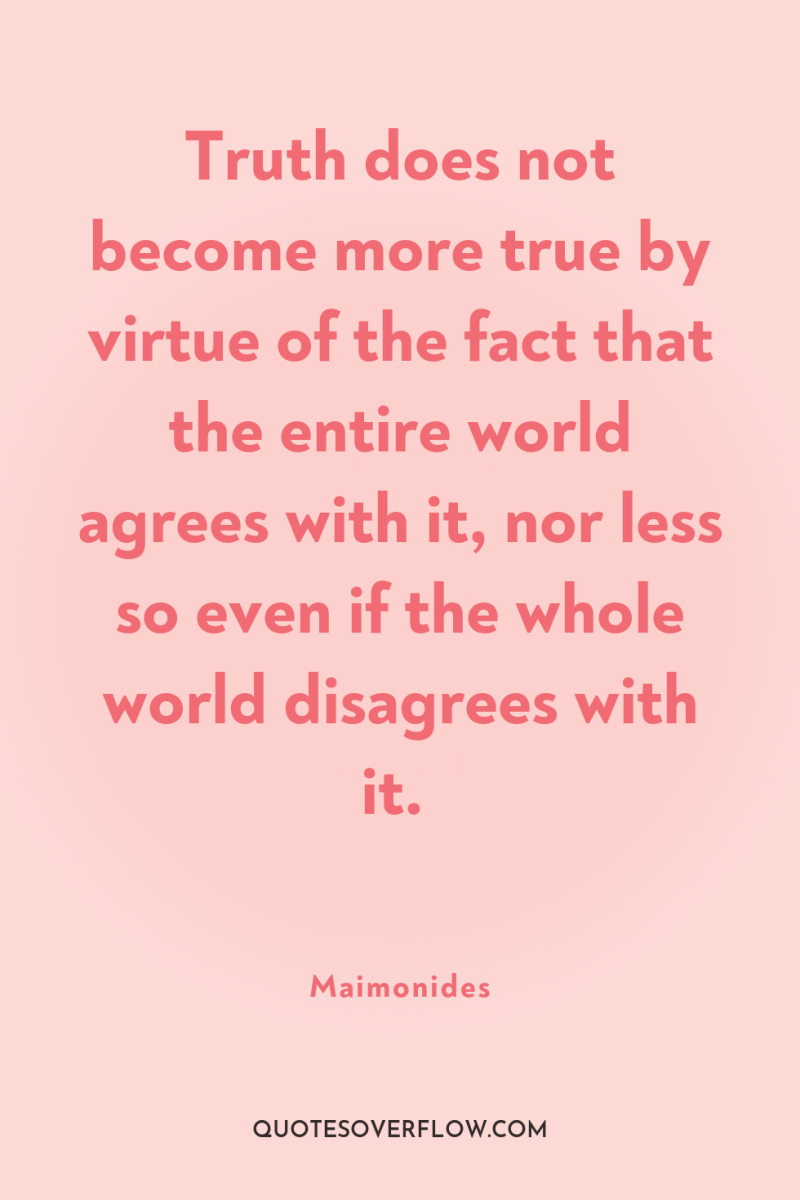
1
Truth does not become more true by virtue of the fact that the entire world agrees with it, nor less so even if the whole world disagrees with it.Maimonides
2
You must accept the truth from whatever source it comes.Maimonides
3
For the elements have the property of moving back to their place in a straight line, but they have no properties which would cause them to remain where they are, or to move other-wise than in a straight line, These rectilinear motions of these four elements when returning to their original place are are of two kinds, either centrifugal, vziz.>the motion of the air and the fire; or centripedal, viz.> the motion of the earth, and the water; and when the elements have reached their original place, they remain at rest.Maimonides
4
You should recognize that man’s soul, this single entity whose powers and parts we have described, may be compared to matter, and that the power of reasoning is its completed form. As long as the soul lies dormant and does not acquire its form from knowledge, then the nature of the soul is useless and exists in vain.Maimonides
5
Your purpose...should always be to know...the whole that was intended to be known.Maimonides
6
The person who wishes to attain human perfection should study logic first, next mathematics, then physics, and, lastly, metaphysics.Maimonides
7
No disease that can be treated by diet should be treated with any other means.Maimonides
8
Every human being should regard himself as if he were exactly balanced between innocence and guilt. Simultaneously he should regard the world as being in the same case. It follows then that if he performs one good deed, he has weighted the scales in favour of both himself and of the whole world, and thus brought about salvation both for himself and for all the inhabitants of the world.Maimonides
9
If a person studies too much and exhausts his reflective powers, he will be confused, and will not be able to apprehend even that which had been within the power of his apprehension. For the powers of the body are all alike in this respect.Maimonides
10
The physician should not treat the disease but the patient who is suffering from itMaimonides
11
When the Rabbis stated that obedience or disobedience to the commandments depends not on the will of Hashem but on man’s free will, they echoed Jeremiah, who said, “Out of the mouth of the Most High there comes neither the bad nor the good” (Lamentations 3:38). By the bad he meant vice, and by the good he intended virtue, meaning that Hashem does not predetermine any person as bad or good. Since this is so, a person owes it to himself to mourn his sins and transgressions, since he has committed them of his own free will, as Jeremiah says, “For what should a living man mourn? Let every man mourn because of his sins” (Lamentations 3:39). Jeremiah answers his question positively, telling us that the remedy for our disease lies with us. Just as our failings stemmed from our own free will, so do we have the power to repent of our evil deeds.Maimonides
12
Now, we occupy a lowly position, both in space and rank in comparison with the heavenly sphere, and the Almighty is Most High not in space, but with respect to absolute existence, greatness and power.Maimonides
13
Transient bodies are only subject to destruction through their substance and not through their form, nor can the essence of their form be destroyed; in this respect, they are permanent.Maimonides
14
He, however, who begins with Metaphysics, will not only become confused in matters of religion, but will fall into complete infidelity.Maimonides
15
Do not imagine that what we have said of the insufficiency of our understanding and of its limited extent is an assertion founded only on the Bible: for philosophers likewise assert the same, and perfectly understand it, - without having regard to any religion or opinion.Maimonides
16
The risk of a wrong decision is preferable to the terror of indecision.Maimonides
17
If men possessed wisdom, which stands in the same relation to the form of man as the sight to the eye, they would not cause any injury to themselves or to others; for the knowledge of truth removes hatred and quarrels, and prevents mutual injuries.Maimonides
18
You will certainly not doubt the necessity of studying astronomy and physics, if you are desirous of comprehending the relation between the world and Providence as it is in reality, and not according to imagination.Maimonides
19
Give a man a fish and you feed him for a day teach a man to fish and you feed him for a lifetime.Maimonides
20
All the great evils which men cause to each other because of certain intentions, desires, opinions, or religious principles, are likewise due to non-existence, because they originate in ignorance, which is absence of wisdom.Maimonides